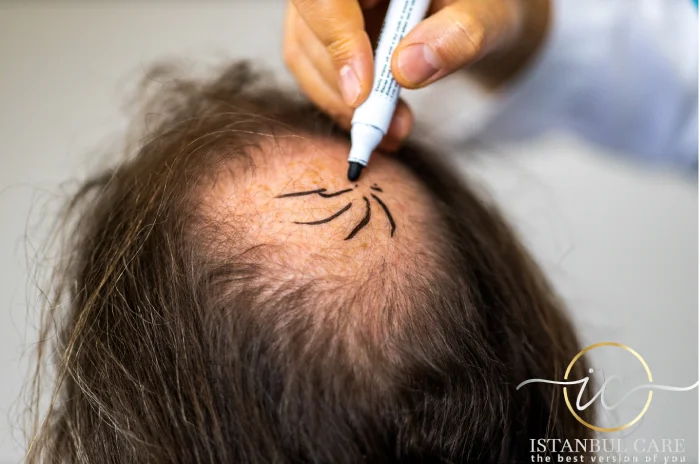Der Einstieg in eine Haartransplantation zu gehen, kann eine wichtige Entscheidung sein. Ganz gleich, ob Sie Ihr Selbstvertrauen zurückgewinnen oder eine zurückweichende Haarlinie behandeln möchten, es ist wichtig, dass Sie bei Ihrer Beratung die richtigen Fragen stellen. In diesem Blogbeitrag finden Sie die wichtigsten Fragen, die Sie bei der Beratung zur Haartransplantation stellen sollten, um sicherzustellen, dass Sie gut informiert und auf Ihren Eingriff vorbereitet sind.
Was sind die verschiedenen Haartransplantationstechniken?
Es ist wichtig, die verschiedenen Haartransplantationstechniken zu verstehen. Die beiden wichtigsten Methoden sind die Follicular Unit Transplantation (FUT) und die Follicular Unit Extraction (FUE). Wenn Sie Ihren Chirurgen bitten, Ihnen diese Methoden zu erläutern und Ihnen die Vor- und Nachteile jeder Methode zu erläutern, können Sie eine fundierte Entscheidung darüber treffen, welches Verfahren für Sie am besten geeignet ist.
Bin ich ein guter Kandidat für eine Haartransplantation?
Nicht jeder ist ein idealer Kandidat für eine Haartransplantation. Faktoren wie das Alter, der Haartyp und das Ausmaß des Haarausfalls spielen eine Rolle. Während Ihrer Konsultation wird Ihr Chirurg Ihr Haarausfallmuster, die Qualität des Spenderhaars und Ihren allgemeinen Gesundheitszustand beurteilen, um festzustellen, ob Sie ein geeigneter Kandidat sind.
Welche Ergebnisse kann ich erwarten?
Realistische Erwartungen sind der Schlüssel zur Zufriedenheit mit Ihrer Haartransplantation. Fragen Sie Ihren Chirurgen nach Vorher-Nachher-Fotos von früheren Patienten mit ähnlichem Haarausfall. Wenn Sie die möglichen Ergebnisse kennen, können Sie sich realistische Ziele setzen und Enttäuschungen vermeiden.
Wie hoch sind die Kosten für das Verfahren?
Die Kosten für eine Haartransplantation können je nach der verwendeten Technik, dem Ausmaß des Haarausfalls und der Erfahrung des Chirurgen stark variieren. Es ist wichtig, dass Sie sich eine detaillierte Aufstellung der Kosten geben lassen, einschließlich möglicher zusätzlicher Kosten. Einige Kliniken bieten Finanzierungsmöglichkeiten an, erkundigen Sie sich also bei Bedarf nach diesen Möglichkeiten.
Wie erfahren sind Sie?
Erfahrung spielt bei der Haartransplantation eine große Rolle. Fragen Sie Ihren Chirurgen nach seiner Ausbildung, wie lange er bereits Haartransplantationen durchführt und wie viele Eingriffe er bereits durchgeführt hat. Außerdem kann ein erfahrener Chirurg die Wahrscheinlichkeit erhöhen, dass Sie das gewünschte Ergebnis erzielen.
Was sind die Risiken und möglichen Komplikationen?
Wie jeder chirurgische Eingriff ist auch die Haartransplantation mit Risiken und möglichen Komplikationen verbunden. Informieren Sie sich über die üblichen Risiken wie Infektionen, Narbenbildung und die Möglichkeit unbefriedigender Ergebnisse. Wenn Sie diese Risiken kennen, können Sie die Vorteile gegen die möglichen Nachteile abwägen.
Wie läuft der Genesungsprozess ab?
Die Nachsorge ist entscheidend für den Erfolg Ihrer Haartransplantation. Erkundigen Sie sich nach dem Zeitplan für die Genesung, eventuellen Einschränkungen bei den Aktivitäten und der erforderlichen Nachsorge. Wenn Sie wissen, was Sie während der Erholungsphase zu erwarten haben, können Sie entsprechend planen und Unterbrechungen Ihrer Routine vermeiden.
Werde ich mehr als eine Sitzung benötigen?
Je nach dem Ausmaß Ihres Haarausfalls und Ihren Zielen können mehrere Sitzungen erforderlich sein. Besprechen Sie diese Möglichkeit mit Ihrem Chirurgen, um sich ein klares Bild über den gesamten Behandlungsplan und den Zeitplan zu machen.
Wie lange wird es dauern, bis ich Ergebnisse sehe?
Das Haarwachstum nach einer Transplantation erfolgt nicht sofort. Um Ihre Erwartungen zu erfüllen, ist es wichtig zu wissen, wann das erste Haarwachstum einsetzt und wann Sie mit einem vollständigen Ergebnis rechnen können. Bei den meisten Patienten ist ein deutliches Wachstum innerhalb von sechs Monaten bis zu einem Jahr nach dem Eingriff zu beobachten.
Gibt es nicht-chirurgische Alternativen?
Für manche Menschen können nicht-chirurgische Behandlungen eine praktikable Option sein. Fragen Sie Ihren Chirurgen nach Alternativen wie Medikamenten (z.B. Minoxidil oder Finasterid) oder einer Behandlung mit plättchenreichem Plasma (PRP). Diese Optionen können für diejenigen in Frage kommen, die für eine Operation nicht bereit oder geeignet sind.
Wir sind bereit, Ihre Fragen zu beantworten
Faktoren wie Alter, Haartyp und das Ausmaß des Haarausfalls beeinflussen die Eignung für die Behandlung.
Machen Sie sich mit Methoden wie der Follicular Unit Transplantation (FUT) und der Follicular Unit Extraction (FUE) vertraut, um die geeignetste Option zu bestimmen.
Um mit dem Ergebnis Ihrer Haartransplantation zufrieden zu sein, ist es wichtig, realistische Erwartungen zu haben.
Die Kompetenz Ihres Chirurgen kann den Erfolg des Eingriffs erheblich beeinflussen.
Das Verständnis der finanziellen Verpflichtung hilft bei der Planung und der Vermeidung unerwarteter Kosten.
Wenn Sie sich der möglichen Risiken bewusst sind, können Sie fundierte Entscheidungen treffen und sich vorbereiten.Die Kenntnis des Zeitplans für die Genesung und die notwendige Nachbehandlung gewährleistet einen reibungslosen Heilungsprozess.
Das Wissen um den potenziellen Bedarf an zukünftigen Eingriffen hilft bei der Festlegung langfristiger Erwartungen.
Folgen Sie uns in den sozialen Medien für Updates, Tipps und Erfolgsgeschichten von Patienten:


